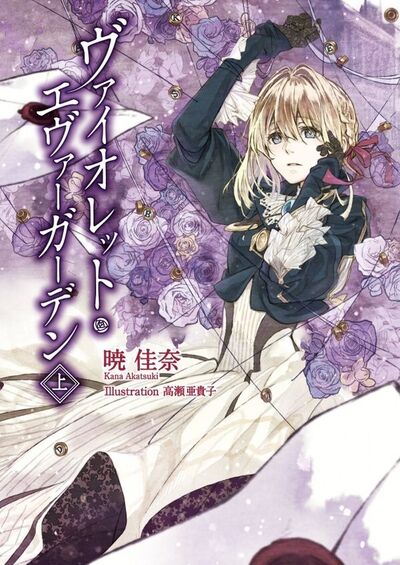Memories Made
Violet Evergarden
By Kana Akatsuki

11 Dec, 2024
Kana Akatsuki’s 2025 Violet Evergarden, Volume 1 (Japanese: ヴァイオレット・エヴァーガーデン, Hepburn: Vaioretto Evāgāden) is the first book in an alternate-world light novel series. Illustrations are by Akiko Takase. The anime is eye-catching.
No sanctioned English translation exists of Violet Evergarden. However, a fan translation attracted my attention, so I thought I’d give it a read.
Auto Memory Dolls began as assistive devices for persons unable to write. They were machines that could transcribe voice into print. Years later, people still use Auto Memory Dolls, but these Dolls are quite different from the original model. They are humans rather than devices.
Playwright Oscar lost both wife and daughter to a heritable disease whose existence had been his wife’s close-held secret… until she became ill. Oscar did not handle bereavement well and the solace to which he turned left him unable to hold a pen or type.
Determined to write again, Oscar secures the services of an Auto Memory Doll, Violet Evergarden. Not being the sort of person who reads the service manuals, Oscar assumes that Violet is some sort of automaton in the form of a pretty woman. Nothing about her rather reserved person suggests otherwise, Her mechanical hands appear robotic.
In fact, Violet is living flesh, albeit with some prosthetics and cognitive deficits. “Auto Memory Dolls” can denote devices or humans (who are usually pretty women who provide transcription services). Despite her flat affect and excessively formal manner, Violet does a good job as an amanuensis.
Violet goes on to work for other clients. A dying woman hires Violet for reasons the dying woman’s daughter cannot understand. A misogynist astronomer hires Violet to transcribe research. A soldier in a warzone hires Violet to convey his dying words to his family. All these clients are helped by Violet, sometimes in unexpected ways.
Having established that Violet has two prosthetic arms, appears emotionless, and possesses superhuman strength and speed, not to mention superlative combat prowess, the novel finally reveals her backstory.
Discovered alone on an otherwise desert island, a careless word inspired the then-child Violet to kill all but one of the soldiers who found her. She then treated the survivor, Dietfried, as her master. The horrified Dietfried returned to the mainland and transferred ownership of the girl to his brother, Major Gilbert Bougainvillea. Surely, in Gilbert’s hands, this terrifying monster could be used as a weapon beyond compare!
And so, Violet became The Battle Maiden of Leidenschaftlich, a name to inspire terror, flight, and immediate surrender.
Having survived the Great War, Violet works as an Auto Memory Doll while struggling to comprehend emotions she is not sure she possesses.
~oOo~
Light novels are short. By the time we reach Violet’s tragic backstory, the first novel in the series ends. Although novel is probably the wrong term, as the structure is more akin to a short story collection.
The book is set in on a continent much like Eurasia, with its own Great Wars, in which the nation of Leidenschaftlich fills more or less the same role as Prussia. Oddly enough, “Prussian” is used to describe a tint of blue, despite there not ever having been a Prussia. The series doesn’t seem to be an alternate history; it’s set in a different universe with its own history that has arrived at almost the same results as our universe1. Somehow.
Violet remembers Gilbert as a noble figure whose loss she still bitterly mourns (without being able to understand what grief is). However, Gilbert is the one who sent Violet out again and again to massacre literal legions of enemy soldiers. Gilbert reminds me of Cassandra “Batgirl” Cain’s father, David.
The author doesn’t explain how Violet got to the island, who her parents were, or why she possesses superhuman speed and strength. Perhaps in one of the succeeding volumes?
Violet lacks affect and interacts with others following rules that she has had to learn; she is stilted and clumsy in social situations. The author leaves readers to find their own explanations for her cognitive deficits. Leidenschaftlich appears to lack disciplines like psychology, and seems to have no interest in developing them, so no help from that quarter. Violet will just have to settle for being described as “odd” and “rather menacing.”
Luckily for her clients, none of them ever say anything Violet interprets as “please kill me.” As well, her lack of affect allows them to project onto her whoever and whatever they need at the moment. Her reflexive obedience means she always plays along with the game.
Generally speaking, it’s a safe bet that if an anime catches my interest, the book will be better. In this case the anime (or at least the episodes I have seen) is much better written than this translation. The book, even taking into account that this is a fan translation, is a combination of regrettable elements and unengaging narrative decisions. Reading was a chore. In the end, I wish I’d just reviewed the anime. Maybe another week.
1: I’d say this reminds me of Royal Space Force: The Wings of Honnêamise, except that reference may be too obscure to be helpful.
